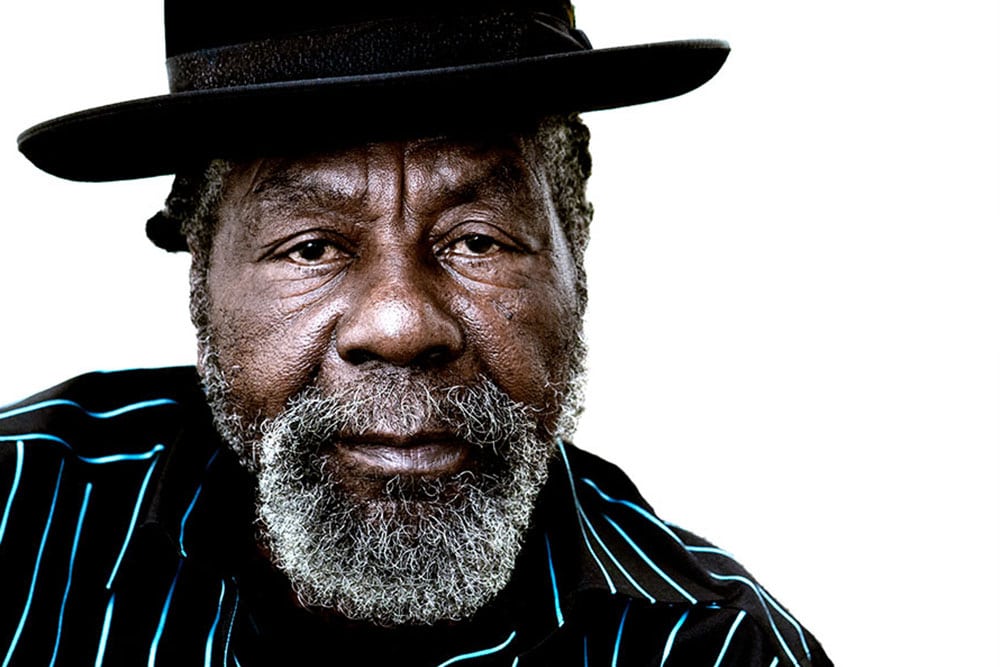Global Beat: U-Roy

Imagine the scene, if you will. Circa late 1969, on a balmy night in funky downtown Kingston, Jamaica, the sound of a booming mobile hi-fi cuts through the humid air, spurring a feisty crowd of revelers to move and sway to a jaunty rocksteady beat. A lone figure jumps up on the flatbed stage; he’s lit from behind by a makeshift spotlight, microphone in hand. “Wake the town and tell the people!” he shouts as the beat drops out, waves of analog reverb soaking his voice. “I’ve got a musical disc I can’t afford to delay!”
Sly Dunbar—a world-class drummer who, along with bassist Robbie Shakespeare, is a partner in the dauntlessly prolific production team of Sly & Robbie—can still see it all in vivid detail. “I was a kid when my mother would send me to buy hot bread for Sunday morning breakfast,” he recalls. “They used to have parties at the end of Bay Farm Road, at a club called Balorama, and that’s where I first heard U-Roy. I used to stop on the other side of the street and I would listen to him toasting over records. I didn’t know him in person, but I knew the voice. So I’d been listening to him live on sound systems before I even heard him on a record.”
U-Roy, born Ewart Beckford, wasn’t the first deejay (or “toaster,” as they came to be known) to rock a microphone. By the mid-1960s, that distinction belonged to Winston “Count Machuki” Cooper—and later to Sir Lord Comic and King Stitt (né Winston Sparkes), who were the first to toast on an actual studio recording. But U-Roy eventually adopted the name “The Originator” for a good reason; it boiled down, quite simply, to style points. With his sing-song delivery, impeccable rhymes and wicked instincts for knowing just when, and how, to fire up a crowd, U-Roy almost single-handedly forged an indelible bridge between the Jamaican roots singers of the ‘70s and the dancehall kings of the ‘80s. And reggae, let alone hip-hop music, would never again be the same.
Over nearly five decades, U-Roy released some 25 albums—including the timeless gems Version Galore, Dread in a Babylon, Natty Rebel and the Mad Professor-produced True Born African—and, in 2018, he met the Trojan Jamaica label’s co-founders, Zak Starkey (son of Ringo and drummer for The Who) and his partner, singer Sharna “Sshh” Liguz. “A friend of ours named Wayne Jobson had the brilliant idea that we could recut U-Roy’s greatest hits,” Starkey says. “So we went to Kingston to meet him, had a really great vibe and we talked about how we wanted to do it. He was such a powerful presence that he knew what he wanted, but he was such a dignified man that he would never ram it down your throat. You could just look at him and go, ‘Wow, there’s something going on with you, man. You’ve got a thing.’”
Solid Gold U-Roy was cut in the Trojan Jamaica studio, a converted jewelry store in the resort town of Ocho Rios. “Nine of the backing tracks were done on day one,” Starkey reveals, “and, about five days later—well, you could feel it. It’s almost like a live album.” With a topflight core band consisting of Sly & Robbie, Soul Syndicate guitarist Tony Chin, keyboardist Robbie Lyn and Starkey himself on guitar— along with a sterling posse of guest vocalists—the album turned out to be U-Roy’s last, which only lends additional weight to the sheer joy of his performance. (U-Roy passed away in February at age 78.) The raucous dancehall skank of “Rule the Nation” (in a duet with Shaggy), the chick-a-bow rhymefest of “Wear You to the Ball” (with Richie Spice), the rootsy lowdown of “Stop That Train” (with next generation superstar Rygin King)—these are just a few of the moments where U-Roy turns back the clock and channels a righteous sense of soul, power and passion.
“You can feel that electricity with Big Youth,” Sshh says, citing the guest drop of one of Jamaica’s most gifted foundational deejays, who got his start in the immediate wake of U-Roy’s rise in the early ‘70s. “Every Knee Shall Bow,” a dub-style classic originally recorded by Johnny Clarke, features U-Roy and Big Youth trading toasts for the first time ever in the studio. “I think they’d only done it once or twice together onstage before,” Sshh continues, “and it was so incredible to witness these two guys just fucking dropping it, you know? They were just showing everyone how it’s done, in one take, on this epic, long track. Usually, in this day and age, people want a three-minute single, but I think everyone gets the intent behind this one because it’s so monumental.”
With additional step-outs by Ziggy Marley, Santigold, Steel Pulse frontman David Hinds and dub mixmaster Scientist, Solid Gold turns out to be a fittingly regal sign-off for one of the true rulers of Jamaica’s dancehall lore. “U-Roy will live forever,” Dunbar insists. “I remember, when he was signed to Virgin Records, we did a tour with the Mighty Diamonds, and when they would go dubwise, the crowd would go mad. He was a complete artist by then. His performance was just locked. He’s coming from the sound system, where he’s performing every night with a microphone in his hand, rapping over records. When he went on to play live, it was like easy street for him, you know? Yeah mon—there will never be another U-Roy.”



















